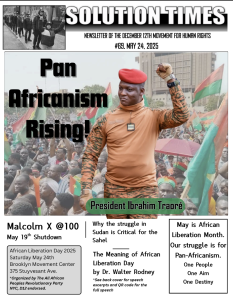Work
Solution Times Newsletter
Issue #69: Pan Africanism Rising: Traoré’s Fight is Our Fight
Fare Ain’t Fair
1 IN 5 NEW YORKERS ARE STRUGGLING TO AFFORD PUBLIC TRANSIT. While the MTA’s solution to our crisis is to INCREASE THE FARE to $3.00 this August, our solution is to REDUCE THE FARE and stop the fare hike and all future fare increases. We refuse to let the MTA continue raising the transit fare, the poor will not pay more!
We demand that the fare be reduced for all New Yorkers living at or below 400% of the Federal Poverty Line and for the City Council to allot the appropriate and necessary funding for this expanded eligibility through the NYC Fair Fares program.
The goal of the Fare Ain’t Fair (FAF) campaign is to reduce the cost of the fare for poor and working-class New Yorkers through EDUCATION, AGITATION, and ORGANIZATION.
Reparations
Since 1989, for over three decades, the December 12th Movement (D12) has been actively engaged in the fight for reparations for descendants of enslaved Africans in the United States and worldwide, addressing the ongoing violations of our human rights.
Our work is inspired by Malcolm X, who viewed the struggle of African Americans in the United States as part of a larger global fight for human dignity—one that must be addressed on an international level. Following Malcolm’s lead, our reparations work links the enslavement of African peoples to the colonization of the African continent. As a result of slavery and colonialism, African peoples have been dispersed and divided by national boundaries. Nevertheless, our struggle remains fundamentally Pan-African, with the fight for reparations uniting African people in a revolutionary battle against the West and its exploitative foundations.
In 1993, through our international work at the United Nations, we were part of the call for a World Conference Against Racism. exercising Black Nationalism and self-determination, we committed to eight years of grassroots organizing, culminating in a delegation of 400 people attending the Durban, South Africa, conference in 2001.
2001 United Nations World Conference Against Racism
D12 organized 400 delegates to ensure that three critical points were included in the Durban Declaration and Programme of Action (DDPA):
- Slavery was a crime against humanity.
- The roots of the transatlantic slave trade were economic.
- Reparations are owed to descendants of enslaved Africans.
D12 played a pivotal role in this significant Pan-African event, which established reparations as a global issue. The Durban conference marked a historic defeat for the United States and other Western nations, while providing a framework for the continued fight for reparations.
Durban 400 Documentary
Summary of Demands
- Reparations for the centuries-long debt owed by the federal government.
- A $50 billion down payment to establish state-of-the-art healthcare facilities owned and controlled by Black communities as an initial measure.
- Regular reparations payments to address the historical and ongoing damages caused by slavery and systemic racism, including in areas such as housing, employment, mass incarceration, and education.
- Unity in the rejection of calls for reparations that seek to divide African people. We are the victims of a collective crime, not based on qualified lineages. Therefore, the repair must be collective, not individuals receiving a check in the mailbox.
Culture as a Weapon
Sistas’ Place opened on September 23, 1995, the born date of revolutionary musician John Coltrane. Its founder, Viola Plummer, the late chairperson of the December 12th Movement, envisioned it being a place where Black people could gather and feel free. Over its 30 years, Sistas’ Place has fulfilled that vision – as a jazz unicorn, a coffee shop, a community center, a cultural gathering place, and a liberated zone in the People’s Republic of Brooklyn. Our stage has been graced with jazz masters and spoken word virtuosos. The overriding sentiment artists express about performing at Sistas’ Place is that it feels like “home.” The give and take between the artists and the audience is electric.
The Sistas’ Place theme, “Culture as a Weapon,” reflects our awareness of the connection between Black culture and Black people’s struggle for human rights and liberation in the U.S. and internationally. The mantra is inspired by the great African leader and thinker Amilcar Cabral who articulated that culture is an essential form of resistance by oppressed people and insurance of their survival. At Sistas’ Place, we bring to our community the politics of culture in all its forms
International
December 12th Movement International Secretariat, a non governmental organization (NGO) with consultative status in the United Nations Economic and Social Council, has participated since 19in the, then Commission on Human Rights now Human Rights Council since 1989, representing 40 million Africans in the United States. The Secretariat has established firm ties and alliances with nations and international organizations around the world. Our consistent and persistent work has resulted in the pivotal hearings on racism and summary executions in the United States.